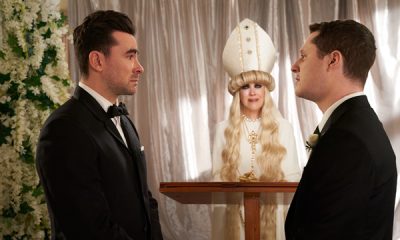Arts & Entertainment
Drag Isn’t Dangerous Telethon raises over $523,000
Final amount raised from the live broadcast was over $523,000. Recording of it will stay online for 48 hours after its conclusion
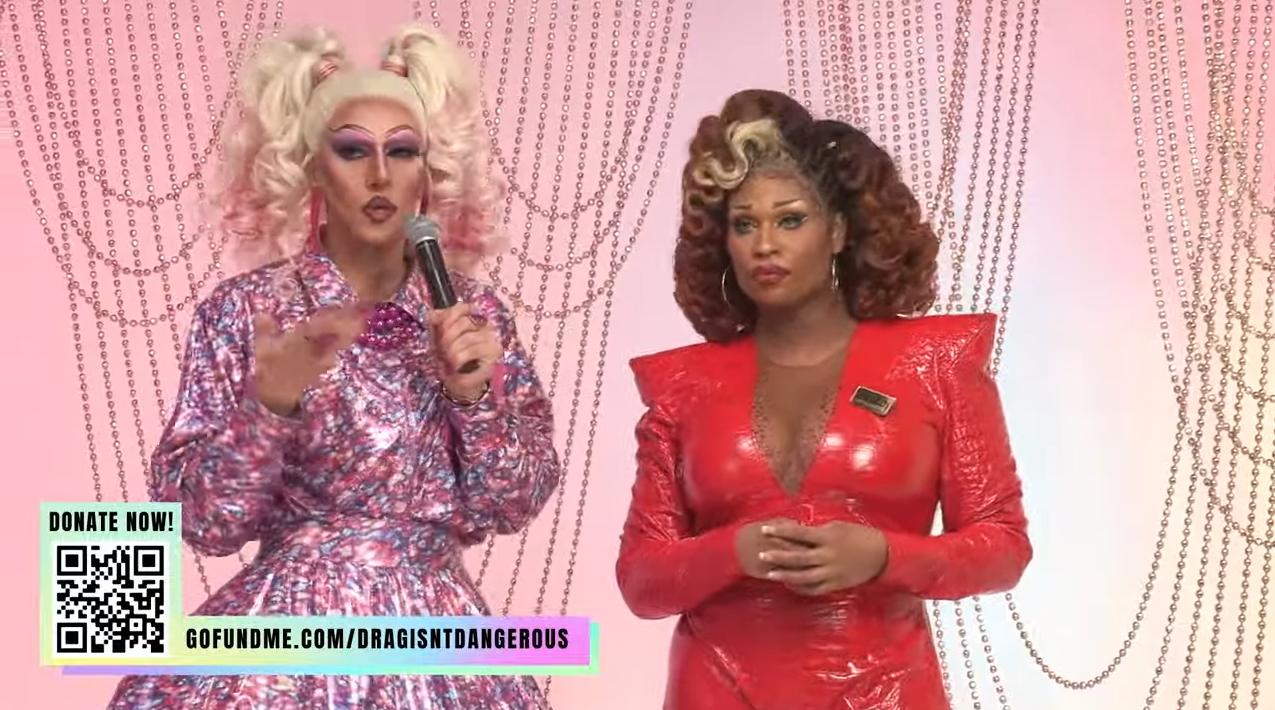
Into the third hour of Drag Isn’t Dangerous, a brief film makes the point that there have been article after article about children molested by church clergy and counselors, yet not a single bill has been proposed tackling that real issue. Then there are drag queens. Drag queens have never harmed a child, and there are no articles implying that they have. Yet … yet … state after state, bill after bill are going after drag queens.
With this telethon event, drag queens and all that they have inspired, have sent the message: They are not going to take this shit anymore. Clips of rightwing pundits and commentators were presented and the ignorant hatred expressed in each clip is both at once chilling, and pathetic.
The message of hate is juxtaposed with segments like one featuring “RuPaul Drag Race” alum Nina West. West told the story about her adventures doing storybook hours at Columbus, Ohio, libraries for children. It should be pointed out that the Nina West brand is one of classiness and kindness. She moved her popular book readings onto Instagram. The first hour where she did so was wonderful.
The second hour was not.
The audience turned “dark, terrifying and threatening.” Then it all got very personal. People showed up at his house where he was broadcasting and blew eardrum breaking airhorns outside his windows. They then started a campaign of harassment and doxing, targeting him, his parents and his sister. Signs appeared in his yard accusing him of being a groomer.
Last December he embarked on a Drag Christmas tour. The tour encountered protesters, bomb threats and required police escorts.
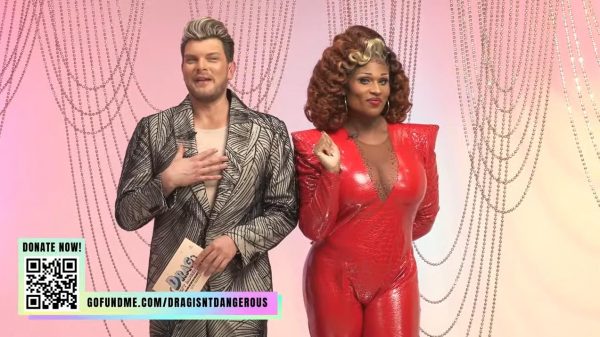
Hosted by Justin Martindale and Peppermint with a co-location hosted by Alaska and Adam Shankman, the telethon team declared a goal target of $250,000 for the evening. The evening was filled with performances from some of the Drag community’s best. Kicking off the evening were songs by Trixie Mattel and Alaska. The online crowd was gobsmacked with exclamations like “legends!” , “fierce!” “That voice!”.
The telethon was a recreation of the traditional telethon style with a phonebank of drag celebrities womaning the phones. Instead of the phone banks of years gone by the receptionists were not the first point of entry to make donations. In this modern version, donors first register their donation on the gofundme application and then are connected to the celebrity to receive thanks and conversation. Phone bank stars included Candis Cayne, Jinx Monsson, Ginger Minge, Laganja Estranja Trinity the Tuck, Monet Exchange and Queer Eye OG Jai Rodriguez.
As of 4:30 p.m., $55,000 had been raised.
Celebrity cameos and interviews were generously sprinkled through the broadcast. Many of them expressed gratitude and awe for the talents and artistic contributions of drag. Still others were downright angry. “I will f*ck anyone who messes with you,” Charlize Theron declared.
“Drag isn’t dangerous, but Leslie Jones IS!” Leslie Jones fumed.
Sarah Silverman also did not mince words. “It is an invented ‘problem’. It creates a REAL problem for the marginalized. I would trust RuPaul before any of you (Republican) hate mongers.” To the drag community, she declared, “If they come for you, they will have to come through me first.”
“Lawmakers are terrified of how bright we are shining,” Adam Lambert stated affirmingly.
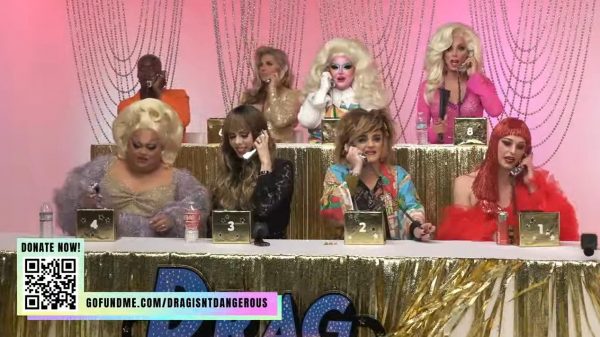
As of 4:50 p.m. $100,000 had been raised.
Donors were interviewed through the phonebank. Jai Rodriguez had an impromptu conversation with a young woman who had come out as queer that day. Even though her experience has been “tough”, she wanted to celebrate her landmark day by donating.
Michele Visage gave RuPaul visibility and spoke from her heart. “I wish I could say that I am glad to be here,” she started. “I am appalled I have to be at something called ‘Drag Isn’t Dangerous.’ Imagine a world where dancers are told they can’t dance; imagine a world where artists are told they cannot take paint to canvas…because it is ‘bad for children.’ That is what is happening to drag right now.”
As of 5:40 p.m., $205,000 had been raised. Jinx Monsson whipped out her own checkbook and wrote a check for $10,000.
Other celebrities added perspective to the issue. Ocean Kelly stated, “They want us to stay quiet. Watching a drag queen won’t make a child queer. If a child is queer, it is because they are … queer.”
Billy Eichner discussed the historical use of scapegoats as distractions. “It is not new, but it is urgent and dangerous,” he warned. “We need to be relentless and loud,” he instructed.
Oscar winner Marcia Gay Harden demonstrated her queer chops by publicly outing her entire family. “All my children are queer,” she declared. “One is nonbinary, one is gay. My first boyfriend was gay and my conservative Naval Officer dad loved him. “ Of the drag controversy she said, “Why are we having to advocate for creativity and imagination? It is so fear-based. We know what love is.”
As of 7:38 p.m., half a million dollars had been raised.
The movement has started and this first outing is not yet over. Recording of it will stay online for 48 hours after it concludes.
Go here for tickets and then receive you email with the telethon link: https://www.moment.co/dangerous/dragisntdangerous-drag-isnt-dangerous-live
As for the end of the Telethon, Ginger Minge show stopped with the classic “I Am What I Am” from La Cage.
I don’t want praise I don’t want pity
I bang my own drum
Some think it’s noise I think it’s pretty
And so what if I love each sparkle and each bangle
Why not try to see things from a different angle
Your life is a sham til you can shout out
I am what I amI am what I am
And what I am needs no excuses
I deal my own deck
Sometimes the ace sometimes the deuces
It’s my life that I want to have a little pride in
My life and it’s not a place I have to hide in
Life’s not worth a danm til you can shout out
I am what I am
********************************************************************

Rob Watson is the host of the popular Hollywood-based radio/podcast show RATED LGBT RADIO.
He is an established LGBTQ columnist and blogger having written for many top online publications including The Los Angeles Blade, The Washington Blade, Parents Magazine, the Huffington Post, LGBTQ Nation, Gay Star News, the New Civil Rights Movement, and more.
He served as Executive Editor for The Good Man Project, has appeared on MSNBC and been quoted in Business Week and Forbes Magazine.
He is CEO of Watson Writes, a marketing communications agency, and can be reached at [email protected] .
Theater
Out dancer on Alvin Ailey’s stint at Warner Theatre
10-day production marks kickoff of national tour

Alvin Ailey American Dance Theater
Through Feb. 8
Warner Theatre
513 12th St., N.W.
Tickets start at $75
ailey.org
The legendary Alvin Ailey American Dance Theater is coming to Washington’s Warner Theatre, and one of its principal veterans couldn’t be more pleased. Out dancer Renaldo Maurice is eager to be a part of the company’s 10-day stint, the kickoff of a national tour that extends through early May.
“I love the respectful D.C. crowd and they love us,” says Maurice, a member of esteemed modern dance company for 15 years. The traveling tour is made of two programs and different casting with Ailey’s masterwork “Revelations” in both programs.
Recently, we caught up with Maurice via phone. He called from one of the quiet rooms in his New York City gym where he’s getting his body ready for the long Ailey tour.
Based in North Newark, N.J., where he recently bought a house, Maurice looks forward to being on the road: “I enjoy the rigorous performance schedule, classes, shows, gym, and travel. It’s all part of carving out a lane for myself and my future and what that looks like.”
Raised by a single mother of three in Gary, Ind., Maurice, 33, first saw Alvin Ailey as a young kid in the Auditorium Theatre in downtown Chicago, the same venue where he’s performed with the company as a professional dancer.
He credits his mother with his success: “She’s a real dance mom. I would not be the man or artist I am today if it weren’t for the grooming and discipline of my mom. Support and encouragement. It’s impacted my artistry and my adulthood.”
Maurice is also part of the New York Ballroom scene, an African-American and Latin underground LGBTQ+ subculture where ball attendees “walk” in a variety of categories (like “realness,” “fashion,” and “sex siren”) for big prizes. He’s known as the Legendary Overall Father of the Haus of Alpha Omega.
WASHINGTON BLADE: Like many gay men of his era, Ailey lived a largely closeted public life before his death from AIDS-related complications in 1989.
RENALDO MAURICE Not unusual for a Black gay man born during the Depression in Rogers, Texas, who’s striving to break out in the industry to be a creative. You want to be respected and heard. Black man, and Black man who dances, and you may be same-sex gender loving too. It was a lot, especially at that time.
BLADE: Ailey has been described as intellectual, humble, and graceful. He possessed strength. He knew who he was and what stories he wanted to tell.
MAURICE: Definitely, he wanted to concentrate on sharing and telling stories. What kept him going was his art. Ailey wanted dancers to live their lives and express that experience on stage. That way people in the audience could connect with them. It’s incredibly powerful that you can touch people by moving your body.
That’s partly what’s so special about “Revelations,” his longest running ballet and a fan favorite that’s part of the upcoming tour. Choreographed by Alvin Ailey in 1960, it’s a modern dance work that honors African-American cultural heritage through themes of grief, joy, and faith.
BLADE: Is “Revelation” a meaningful piece for you?
MAURICE: It’s my favorite piece. I saw it as a kid and now perform it as a professional dance artist. I’ve grown into the role since I was 20 years old.
BLADE: How can a dancer in a prestigious company also be a ballroom house father?
MAURICE: I’ve made it work. I learned how to navigate and separate. I’m a principal dancer with Ailey. And I take that seriously. But I’m also a house father and I take that seriously as well.
I’m about positivity, unity, and hard work. In ballroom you compete and if you’re not good, you can get chopped. You got to work on your craft and come back harder. It’s the same with dance.
BLADE: Any message for queer audiences?
MAURICE: I know my queer brothers and sisters love to leave with something good. If you come to any Ailey performance you’ll be touched, your spirit will be uplifted. There’s laughter, thoughtful and tender moments. And it’s all delivered by artists who are passionate about what they do.
BLADE: Alvin Ailey has been a huge part of your life. Thoughts on that?
MAURICE: I’m a believer in it takes a village. Hard work and discipline. I take it seriously and I love what I do. Ailey has provided me with a lot: world travel, a livelihood, and working with talented people here and internationally. Alvin Ailey has been a huge part of my life from boyhood to now. It’s been great.
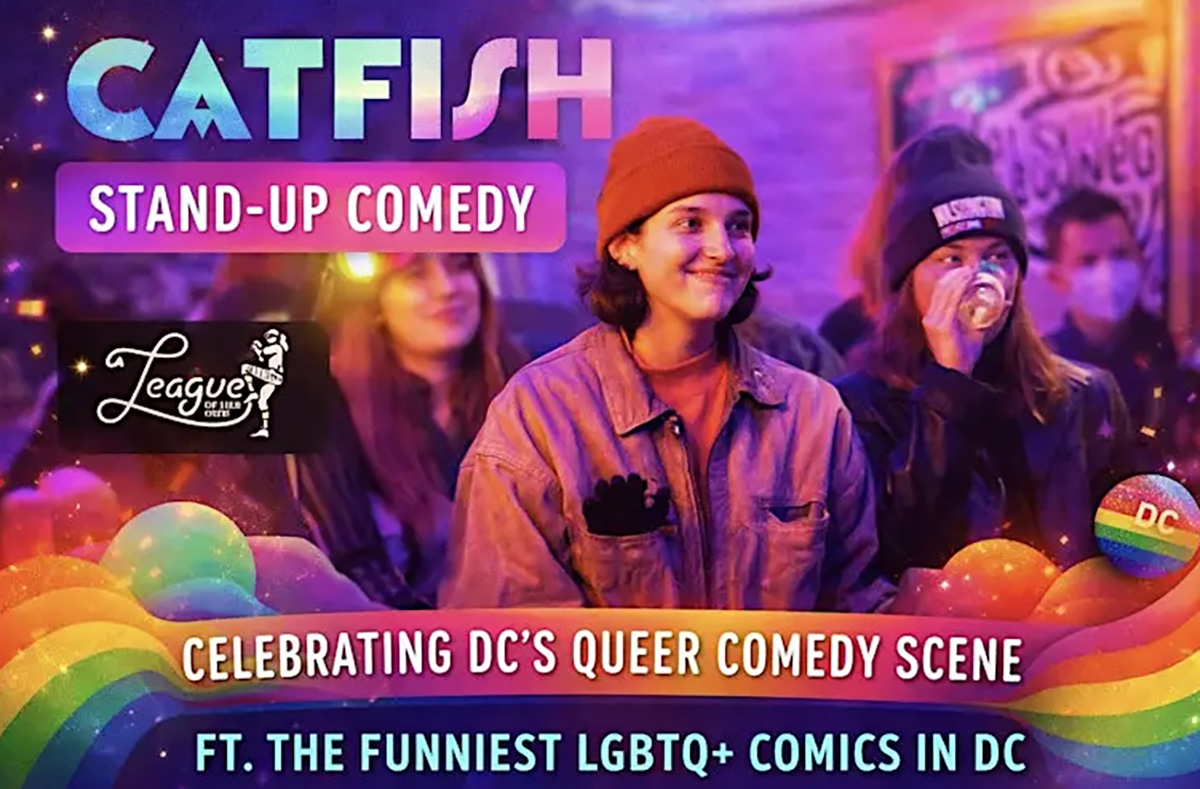
Catfish Comedy will host “2026 Queer Kickoff Show” on Thursday, Feb. 5 at A League of Her Own (2319 18th Street, N.W.). This show features D.C.’s funniest LGBTQ and femme comedians. The lineup features performers who regularly take the stage at top clubs like DC Improv and Comedy Loft, with comics who tour nationally.
Tickets are $17.85 and can be purchased on Eventbrite.
Arts & Entertainment
Catherine O’Hara, ‘Schitt’s Creek’ star and celebrated queer ally, dies at 71
Actress remembered for memorable comedic roles in ‘Beetlejuice’ and ‘Home Alone’
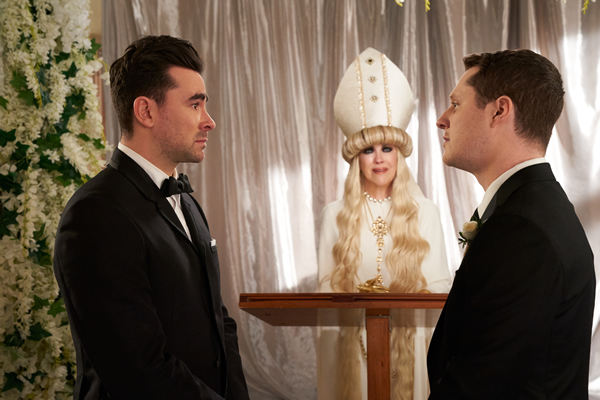
Catherine O’Hara, the varied comedic actor known for memorable roles in “Beetlejuice,” “Schitt’s Creek,” and “Home Alone,” has died at 71 on Friday, according to multiple reports. No further details about her death were revealed.
O’Hara’s death comes as a shock to Hollywood, as the Emmy award-winning actor has been recently active, with roles in both “The Studio” and “The Last of Us.” For her work in those two shows, she received Emmy nominations for outstanding supporting actress in a comedy series and outstanding guest actress in a drama series.
In 2020, O’Hara won the Outstanding Lead Actress in a comedy series award for her work in the celebrated sixth and final season of “Schitt’s Creek.” She was also known as a queer ally and icon for her theatrical and often campy performances over multiple decades. In “Schitt’s Creek,” she played Moira Rose, the wig-loving mother of David Rose (played by series creator Dan Levy). David is pansexual, but the characters around him simply accept him for who he is; the show was embraced by the LGBTQ community with how naturally David’s sexuality was written and portrayed. That show ran from 2015 to 2020 and helped bring O’Hara and her co-stars into a new phase of their careers.
In a 2019 interview with the Gay Times, O’Hara explained why the show got LGBTQ representation right: “Daniel has created a world that he wants to live in, that I want to live in. It’s ridiculous that we live in a world where we don’t know how to respect each other and let each other be. It’s crazy. Other shows should follow suit and present the world and present humans as the best that we can be. It doesn’t mean you can’t laugh, that you can’t be funny in light ways and dark ways. It’s all still possible when you respect and love each other.”
Additional credits include “SCTV Network” (for which O’Hara won a writing Emmy), “Beetlejuice Beetlejuice,” “Curb Your Enthusiasm,” “Six Feet Under,” “Best in Show,” “Home Alone 2: Lost in New York,” and “Dick Tracy.” O’Hara also lent her voice to “The Nightmare Before Christmas,” “Chicken Little,” “Monster House,” and “Elemental.” O’Hara was expected to return for Season 2 of “The Studio,” which started filming earlier this month.
-

 The White House5 days ago
The White House5 days agoExpanded global gag rule to ban US foreign aid to groups that promote ‘gender ideology’
-

 National4 days ago
National4 days agoFederal authorities arrest Don Lemon
-

 Arts & Entertainment4 days ago
Arts & Entertainment4 days agoCatherine O’Hara, ‘Schitt’s Creek’ star and celebrated queer ally, dies at 71
-

 a&e features4 days ago
a&e features4 days agoD.C. LGBTQ sports bar Pitchers listed for sale



















